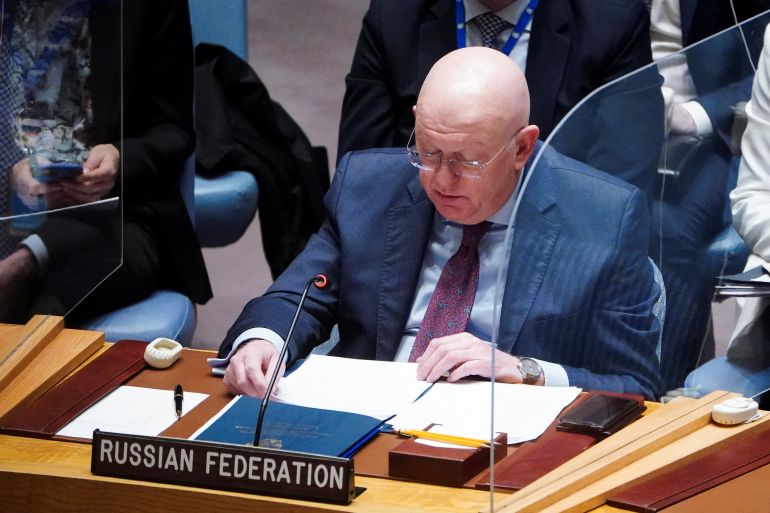UN says not aware of biological weapons programme in Ukraine
US envoy to UN rejects Moscow’s unproven claims that Ukraine is operating biological weapons labs with US support.

The United Nations has said it is not aware of a biological weapons programme in Ukraine, as Russia’s claim that such a programme exists was rejected by Washington and its allies at an emergency Security Council meeting.
Russia called the meeting on Friday to discuss its unproven allegations that Ukraine is operating biological weapons laboratories with support from the United States.
Keep reading
list of 3 itemsBiden revokes Russia trading status, bans vodka, diamond imports
Will the sanctions against Russia work?
Izumi Nakamitsu, the UN High Representative for Disarmament Affairs, told the 15-member council that the UN is “not aware of any biological weapons programmes” in Ukraine.
Nakamitsu said both Ukraine and Russia are state parties to the Biological Weapons Convention (BWC), an international treaty that prohibits such weapons. “Biological weapons have been outlawed since the BWC entered into force in 1975,” she added.
The discussion came amid Russia’s ongoing military invasion of Ukraine, which began on February 24 and has since seen Russian troops launch attacks on Ukrainian cities and advance towards the capital, Kyiv. The conflict has forced more than 2.5 million people to flee Ukraine so far.
The Russian ambassador to the UN, Vassily Nebenzia, said during Friday’s UN Security Council meeting that Moscow had discovered a network of 30 biological weapons labs in Ukraine.
But that was rejected by Nebenzia’s US counterpart, Linda Thomas-Greenfield, who accused Russia of “attempting to use the Security Council to legitimise disinformation and deceive people to justify President [Vladimir] Putin’s war of choice against the Ukrainian people”.
“I will say this once: Ukraine does not have a biological weapons programme. There are no Ukranian biological weapons laboratories supported by the United States, not near Russia’s border or anywhere,” Thomas-Greenfield told the council.
Under a 2005 agreement, the Pentagon has assisted several Ukrainian public health laboratories with improving the security of dangerous pathogens and technology used to research. Those efforts have been supported by other countries and the World Health Organization (WHO).
The WHO told the Reuters news agency on Thursday that it had advised Ukraine to destroy high-threat pathogens housed in its public health laboratories to prevent “any potential spills” that would spread disease among the population.
The White House earlier this week rejected as “preposterous” Russia’s allegations that the US is operating biowarfare labs in Ukraine, accusing the Kremlin of preparing a pretext to use chemical or biological weapons in its offensive.
Ukrainian President Volodymyr Zelenskyy also dismissed Russia’s allegations in a video address on Thursday, saying, “No one is developing any chemical or any other weapons of mass destruction” in Ukraine.
We took note of Russia’s false claims about alleged U.S. biological weapons labs and chemical weapons development in Ukraine. We’ve also seen Chinese officials echo these conspiracy theories.
— Jen Psaki (@PressSec) March 9, 2022
Barbara Woodward, the British ambassador to the UN, also forcefully rejected the Russian allegations, telling the Security Council that Moscow had made “a series of wild, completely baseless and irresponsible conspiracy theories”.
“There is not a shred of credible evidence that Ukraine has a biological weapons programme … This is yet another lie in Russia’s disinformation campaign.”
Al Jazeera’s Mike Hanna, reporting from the UN on Friday, noted that China’s ambassador to the UN, Zhang Jun, was the only member of the Security Council to have given “any credence whatsoever” to Russia’s claims.
“However, he was somewhat restrained in terms of his tone, calling very moderately for a full investigation because of the danger of any form of military and biological warfare,” Hanna said. “Also making very clear that China would want to take an active part in helping other nations secure a truce between Russia and Ukraine.”
Russia has been under growing international pressure to stop the war in Ukraine, with the US and the European Union issuing a wide range of sanctions against Russian leaders and oligarchs, as well as key drivers of the country’s economy, including the energy sector.
Earlier on Friday, US President Joe Biden announced that Washington was revoking Moscow’s “most favoured nation” trading status, a move that allows the US to impose higher tariffs on Russian products.